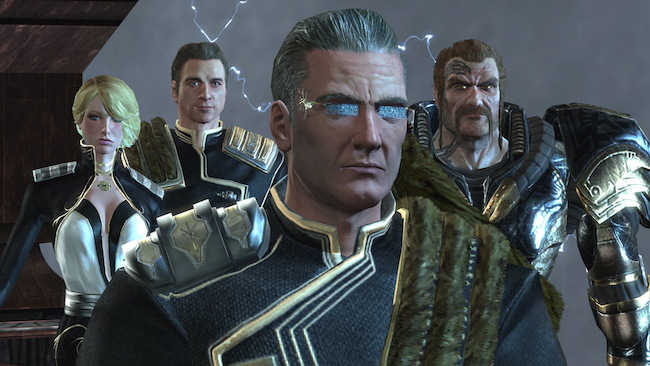
Editor Note: If you’re not familiar with the term “pile of shame”: basically, it’s all the games you’ve purchased over the years but never gotten around to playing. We’re now working our way back to retrospectively review some of ours!
When I first purchased my Xbox 360, more than eight years ago, there were two Sci-Fi trilogies I had my eyes on: Mass Effect and Too Human. The first, despite being a genuinely well designed game, never had any chance of living up to the incredible hype I had built in anticipation, but I still really enjoyed it and the sequels which followed. The second, however, I didn’t ever get around to playing; in part, this was due to the mediocre review from Kevin VanOrd on GameSpot, but mostly because of the controversy with Epic Games and Denis Dyack’s behaviour online. You can’t just go calling people stupid for not appreciating your artistic vision, no matter how far ahead of its time you think it is.
Needless to say, there was no trilogy. In fact, Silicon Knights doesn’t exist anymore as the studio eventually lost their on-going legal battle against Epic Games. As a result, all unsold copies of any game built using Unreal Engine 3 were ordered to be destroyed, with any digital copies to be pulled down. In combination with punitive damages, this was the end for them. The sad thing about the entire situation, though, is that Silicon Knights were once considered to be one of the more innovative and creative studios in the business, with several cult hits such as Legacy of Kain and Eternal Darkness. Was Too Human really that mediocre, or was it more a case of unrealistic expectations and online controversy that tarnished its reputation? Whatever the case, I thought it was time I played it and found out for myself.

What if the ancient legends were actually true, and all the folk stories of heroes and monsters were simply a means for the average person to explain extraordinary events? This is the premise for Too Human, and an idea I immediately resonated with. Too Human specifically explores Norse mythology, proposing that the gods were actually a race of cybernetically advanced people, fighting to protect humanity from a collective of sentient machines. In Profiles of the Future, Arthur C. Clarke said, “Any sufficiently advanced technology is indistinguishable from magic,” which fits very well with the theme of the game. It’s a fascinating topic to explore, and one reason I think the game received a lot of attention during the production stage. It’s just a shame the end product is not nearly as intelligent as it first sounded.
Too Human tells the story of a Norse god named Baldur (well, sort of). Basically, there was a large-scale war between man and machine one thousand years ago, that sent the world into a second ice age. With most of the world becoming uninhabitable, and the machines on the rise, a race of cybernetically advanced people calling themselves to Aesir rose above man as “gods” to fight the machines and protect humanity. It’s an interesting concept that employs a unique take on Norse mythology, but never goes any further than that. At only 12 hours in length, with most of that spent in lengthy dungeon crawls, there is little exposition to dig deeper beyond the initial premise. Internet research can be helpful, but even then, the game stops at a point in the narrative that could only be justified as the first act, and concludes with the assumption that there would be sequels. It doesn’t justify a trilogy, though, and could have easily been one game had the time been invested. Narratively, it is unfulfilling, incomplete, and a waste of great potential.

Too Human is a game that feels as if it was meant to be so much more, but ultimately settled to be a competent “Dungeon Crawler.” Throughout the game, players are given the opportunity to explore the futuristic city of Asgard, but this is mostly for superficial purposes. Basically, it is where most of the narrative exposition takes place, and where you can use your bounty to purchase weapons. You can also visit “The World Tree”; a portal to a realm known as cyberspace, which players can explore for additional loot and upgrades. It’s nothing like its original competitor, Mass Effect, however. You can’t really talk to anyone or do anything, and the schematics you pickup while dungeon crawling will outdo anything from Tyr’s weapon store. I suspect it was going to more important during an earlier stage of production, but all it actually does is provide the player with the illusion of non-linear agency. Its grandiose design is impressive, but it merely acts as a pathway to the next cutscene. There are no sidequests. It’s just there to look pretty.
With that being said, while many other games were beginning to opt out for more stream-lined RPG mechanics, Too Human came fully equipped with a diverse range of character classes, skill trees, abilities, equipment options, and plenty of complicated stats to manage. If you’re a fan of Diablo, you’ll feel right at home, and this is where the game steps beyond mediocrity to shine brightest. There are four main acts, with each clocking in at around 2-3 hours. They’re a bit drawn out, but there’s plenty of room for experimentation which makes for a surprisingly compelling experience when everything works as expected. The problem, however, is that it’s all made redundant as there are no punishing consequences for death other than a slow respawning sequence where a Valkyrie will collect the player and move them away from combat. This quickly downplays the importance of a thoughtful loadout, allowing lazy players to just grind their way through. The potential for a good dungeon crawler is present, but too often it struggles to realise it.

When the game first released, there was a lot of criticism surrounding the decision to map melee attacks to the right thumbstick. Personally, I found the stick controls to be generally intuitive once I was able to get my head around it; making the transition between physical attacks and shooting was easy to manage. Enjoyable, even! The problem, however, was not being able to manually control the camera, which could prove to be very problematic at times. The camera reset button worked okay, but I think, had they allowed the left bumper to enable manual control while moving, it could have partially resolved that problem. Even so, I still liked that I could use guns in a way that didn’t try to emulate a modern shooter with an over the shoulder camera, and that I had the option to zoom out to an isometric view. It felt different to most other games, and I could appreciate it for that; even if it wasn’t always entirely accurate.
Above all else, the gameplay is driven by the desire for more loot, and to experiment with the many different kinds of weapons, ammo types, and abilities. There is also diversity in play style depending on what class you choose, which can provide replay value for those who want that quality in a game. It’s worth noting that there are also various portals into cyberspace which allow you to move obstacles in the real world, but they’re mostly trivial actions. If you’re not a fan of dungeon crawlers, you’re probably not going to have a good time as that’s arguably the thing it does best, and it’s still pretty average in that regard. The crawls are a bit too long if you’re playing alone, and the lack in enemy variety and behaviour can grow tiresome quickly. I think, had the game focused on improving the crawling elements, as well as allowing up to 4-player co-op, it could have been something special. It’s not, though. Sadly. It’s simply just decent.

Graphically speaking, Too Human is arguably up there with many of the other games built using Unreal Engine 3; though, the frame-rate can be a bit choppy during cutscenes. I remember being impressed when the game was first revealed, and I think it still holds up pretty well by today’s standards. Everything about the “Cyber-Norse” inspired artwork has a grand and compelling feel about it, so it’s easy to imagine why so many people thought this game was going to be massive when it was first announced. With that being said, though, there is also little diversity with the level design and the enemies that populate them; which are mostly just robotic imaginings of Tolkien creatures, i.e. goblins, elves, and trolls – It feels a bit cheap. Asgard might be superficial, but it’s probably the coolest thing about it.
In combination with the interesting visuals, the soundtrack and voice cast fitted in well with both the theme and tone of the overall experience. The music always seemed to match well with what was happening on screen, and the voice actors managed to deliver a decent performance that didn’t overplay the Viking element. In retrospective, having seen both of the Thor movies as well as the Vikings series prior to playing, I think I was able to appreciate the direction they were aiming for a little better as I recognised a lot of small details which made it interesting. The only unforgivable element of the entire presentation were the human soldiers that follow you around. They have, by far, the most annoying dialogue I’ve had to endure in a very long time. I just wanted them to shut up, so I’m glad they died quickly.
Too Human is a game that tried to exceed the sum of its parts, and failed. It began with a unique premise, but then barely managed to scratch the surface of what could have been a compelling narrative. I could see lots of great ideas as I played through the game, and it was frustrating to see how many ended up with a superficial application. What’s arguably more tragic, however, is that there’s actually a competent dungeon crawler beneath all the garbage; which I genuinely enjoyed playing at times, even it had its flaws. If the developers had focused on these strengths, the game could have been a success for entirely different reasons; especially had 4-player co-op been considered. Instead, it became consumed with the obsession of trying to be more than it needed to be, and ended up incomplete as a result. I’m glad I played Too Human, but I can’t help but feel disappointed by the waste of such a fascinating concept.











